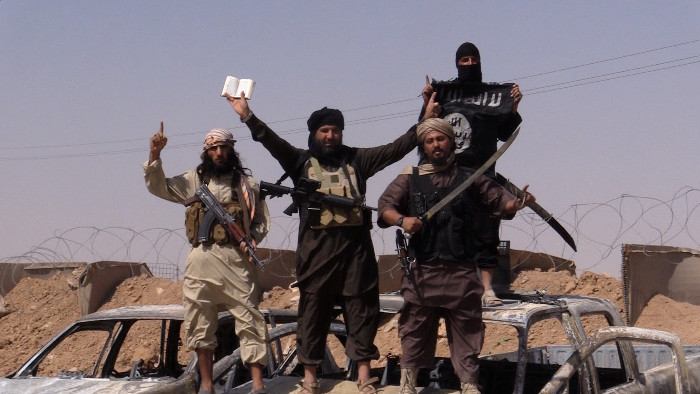With last week’s beheading of the British citizen Alan Henning bringing the tally of heavily publicised reprisals for Western intervention against ISIS to five, it seems appropriate to question whether or not such tactics might reap benefits for IS. The official stance of Western democracies who see their citizens fall victim to such acts of brutality is one of non-negotiation. The death of Mr Hervé Gourdel – a French citizen – on September 24th was met with obvious outrage,, but also a steadfast assertion from President François Hollande that such acts must not go unpunished, and that France would not waver from its decision to join a US-led coalition to bomb ISIS militants in Iraq and Syria.

Similarly, the decapitation of two US citizens in August (journalists Steven Sotloff and James Foley) achieved little more than sparking global indignation and arguably a hardening of American resolve. As for the beheading of British aid worker David Haines in Syria, it has done little to dissuade Britain from pursuing a similar path to France, which is to say joining in on the aerial attacks against ISIS at the Iraqi government’s behest (something it decided to do around 5:30 BST on Friday afternoon, September 26, 2014).
Put that way, Britain’s, France’s and the US’s behaviour could well be construed as callous and cavalier. However, the only truly viable response for the three countries’ leaders was to express regret while vowing to stay the chosen course of action. As François Hollande put it, ‘it is not weakness that should be the response to terrorism, but force.’
And yet it is believed that France does in fact have a history of negotiating with terrorists. Millions have reportedly been paid out (or arranged to be paid out by allies) in ransoms in exchange for the lives of French hostages in recent years (four were released from Syria last year); there is every chance that France tried to secure Mr Gourdel’s safety with the offer of a pay-off last week.
Were this all true, it would certainly be in France’s best interest to keep it hidden, and it has indeed denied the allegations. Although such acts of paying up would hardly be susceptible to domestic scrutiny and disagreement, acknowledging that ransoms are an option would be to admit that, “yes, sometimes we do negotiate with terrorists.” Divulgence of details of ransoming would be tantamount to acknowledging that terrorism works as a tactic. Furthermore it would provoke the anger of countries who operate a zero tolerance policy on negotiations with terrorists, such as the U.S. The supposed success of the Madrid train bombings in 2005 is a sufficiently dangerous precedent without another major western power being seen to give in to terrorist demands.
Naturally there is an obvious difference between France giving in to demands for money and capitulating to an ultimatum aimed at stopping their military campaign, especially when said campaign is being carried out predominantly because IS is deemed to pose a direct threat to France and wider international security. This latter point is crucial: it is genuinely believed that the French homeland is threatened. The same also goes for Britain and the US. Young jihadists have been making their way from the three countries (in fact from all over the world) to Syria and Iraq, in order to join ISIS. The fear that these jihadists will return to their countries and carry out terrorist attacks – whether of their own accord or under a higher IS authority’s directions – is a very real one, and one which is obviously influenced by the all-too fresh memory of the 9/11 and 7/7 attacks carried out against the US and the UK respectively.
As such, the rhetoric which has emerged in recent weeks – one of annihilation of IS and of rejection of isolationism – is not simply hot air or bravado: it stems from a perceived threat to domestic security. As a result, while the beheading of Western citizens is deplorable and the need to reaffirm one’s military resolve and goals regrettable, both stand every chance of continuing unimpeded, feeding off one-another in a vicious cycle of ultimatums, reprisals and resolve-strengthening. This seems even more likely if we consider the argument that IS is carrying out beheadings not so as to halt the aerial campaign, but in fact to provoke the West. Such a strategy may seem counterproductive given the massive threat posed by the combined military might of the coalition, but considering the erratic and barbaric behaviour of the ISIS militants to date, rationality is by no means a given: merely being seen to attack the ‘Great Satan’ might be a priceless achievement.
The reasons behind the beheadings could be related to either a classic understanding of terrorism, or a more ideology-centric one. The former rests on the belief that sufficiently brutal attacks against a countries’ citizens will coerce it into accepting concessions or capitulating to demands (provided it is sufficiently weak-willed). The second understanding of terrorism is far less tangible, and would be geared towards undermining the West wherever possible and no matter the ramifications. However, whatever the rationalizing (if it exists), the beheadings stand little chance of achieving much other than indignation the world over.
Perhaps a far more coherent effort aimed at attacking IS’s enemies where it truly hurts (the Paris or New York metros, for example) would prompt some Western second guessing. However if the responses to 9/11 and the 7/7 London bombings are anything to go by, even such extensive attacks would not work. Until the bombing campaign comes to a conclusion, the beheadings will likely continue. The question is not, “How effective will they be?” so much as “How fruitful will the aerial campaign be, and therefore when will the executions come to an end?”





